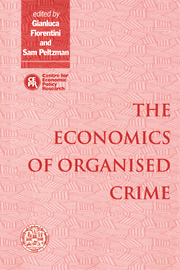Book contents
- Frontmatter
- Contents
- List of figures
- List of tables
- Foreword
- Acknowledgements
- List of conference participants
- 1 Introduction
- PART I THEORIES OF THE STATE AND THE ORIGIN OF CRIMINAL ORGANISATIONS
- 2 Organised crime, mafia and governments
- Discussion
- 3 Gangs as primitive states
- Discussion
- PART II THE CRIMINAL ORGANISATION AS A FIRM
- PART III ORGANISED CRIME AND STATE INTERVENTION IN THE ECONOMY
- PART IV DETERRENCE POLICIES AGAINST LEGAL FIRMS INVOLVED IN ILLEGAL ACTIVITIES
- PART V DETERRENCE POLICIES AGAINST ORGANISED CRIME
- Index
3 - Gangs as primitive states
Published online by Cambridge University Press: 04 August 2010
- Frontmatter
- Contents
- List of figures
- List of tables
- Foreword
- Acknowledgements
- List of conference participants
- 1 Introduction
- PART I THEORIES OF THE STATE AND THE ORIGIN OF CRIMINAL ORGANISATIONS
- 2 Organised crime, mafia and governments
- Discussion
- 3 Gangs as primitive states
- Discussion
- PART II THE CRIMINAL ORGANISATION AS A FIRM
- PART III ORGANISED CRIME AND STATE INTERVENTION IN THE ECONOMY
- PART IV DETERRENCE POLICIES AGAINST LEGAL FIRMS INVOLVED IN ILLEGAL ACTIVITIES
- PART V DETERRENCE POLICIES AGAINST ORGANISED CRIME
- Index
Summary
Introduction
The term ‘organised crime’ consists of two words that to a certain extent contradict each other. On the one hand, a ‘crime’ is by definition an illegal act that usually, but by no means always, goes against society's norms and mores. Criminal acts and the persons committing them are relegated to the margins of the polity and the state and they are considered an aberration, an exception to the rule, something random. On the other hand, the adjective ‘organised’ means ‘having a formal organization to coordinate and carry out activities’. An organisation usually implies the presence of written and unwritten rules and norms of conduct together with sanctions against possible offenders. That is, even illegal organisations have a semblance of a legal framework and a culture. The contradiction in the term ‘organised crime’ lies, then, in the fact that criminal organisations cannot be considered aberrations and random individual phenomena, but rather they can represent a challenge to the existing legal framework and possibly to the state and the political system itself.
But the relationship between state authorities and gangs or other elements of organised crime is seldom completely antagonistic. Often the relationship is symbiotic, a ‘live-and-let-live’ arrangement. For the police, the justice system, the politicians all have to come to terms with the fact that the state does not have complete control and frequently in the duopoly of violence that exists in the gang's territory the gang has the largest market share. Hence, despite the occasional mobilisations of the state and the official proclamations, tacit arrangements of division of turf and self-restraint on the part of both gangs and state authorities represents the more normal state of affairs.
- Type
- Chapter
- Information
- The Economics of Organised Crime , pp. 61 - 81Publisher: Cambridge University PressPrint publication year: 1996
- 9
- Cited by



